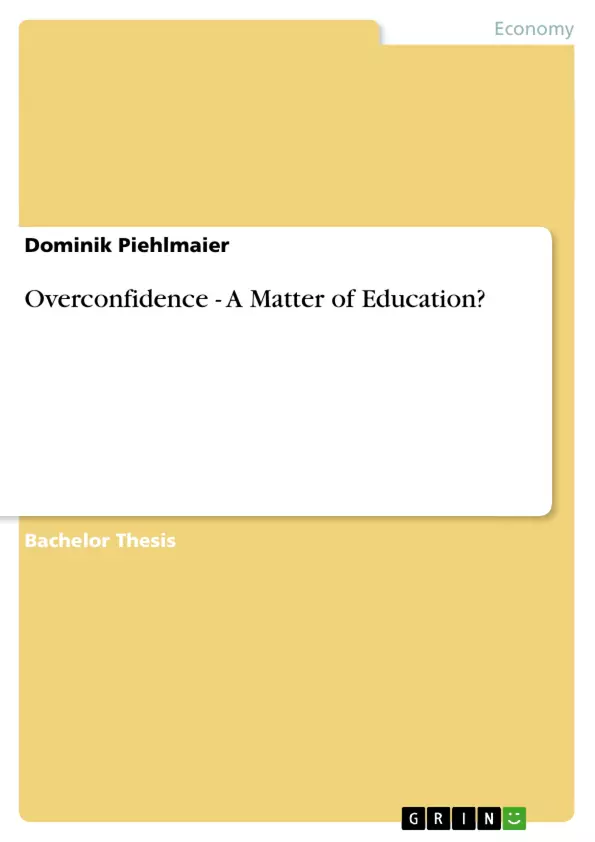This work examines the relationship between education and excessive confidence in situations of uncertainty. For this purpose, a questionnaire with 10 pseudo general knowledge questions was designed, whereby their degree of difficulty exceeds the knowledge of an average student by far. It was investigated whether subjects (N = 535) would acknowledge this condition and its associated nescience. If that is the case, they will answer the 10 questions within an extremely wide confidence interval in order to meet the predefined 90% accuracy requirement. The focus of investigation was in Southern Germany, as the school system regularly receives top marks in national educational rankings. The data analysis resulted in the stochastic proof that there are significant differences between the various educational institutions in accuracy and overconfidence.
In addition to the empirical study the paper defines the distortion of judgment and identifies its relevant factors. It gives a detailed explanation of the German education system and states the criticism of the concept of overconfidence. The paper concludes with a recommendation for action and ventures a look ahead.
------------------------
Diese Arbeit untersucht den Zusammenhang zwischen Bildung und übermäßigem Selbstvertrauen in Situationen von Ungewissheit. Dazu wurde ein Fragebogen mit 10 Quasi-Allgemeinwissensfragen entwickelt, wobei deren Schwierigkeitsgrad das Wissen eines durchschnittlichen Schülers bei Weitem übersteigt. Es wurde untersucht, ob die Probanden (N=535) diesen Zustand und ihre damit verbundene Unwissenheit anerkennen und zur Beantwortung der 10 Fragen, innerhalb eines vorgegebenen 90% Konfidenzintervalls, jenen Vertrauensbereich möglichst weit wählen, um die Anforderungen zu erfüllen. Der Fokus der Untersuchung lag in Süddeutschland, da das dortige Schulsystem regelmäßig Bestnoten im nationalen Bildungsvergleich erhält. Die Datenauswertung resultiert in der Erbringung des stochastischen Beweises, dass es zwischen den Bildungseinrichtungen einen signifikanten Unterschied beim Schätzverhalten und der damit verbundenen Vertrauens-Hypertrophie gibt.
Neben der empirischen Untersuchung definiert die Arbeit den Begriff des übermäßigen Selbstvertrauens und benennt die relevanten Einflussfaktoren. Das deutsche Bildungssystem wird dabei ebenso beleuchtet, wie die Kritik am Konzept der Heuristik. Die Abhandlung endet mit einer Handlungsempfehlung und einem Ausblick in die Zukunft.
Inhaltsverzeichnis (Table of Contents)
- Table of Contents
- List of Graphs
- Abbreviations
- Abstract
- Overconfidence: The Harmful Optimism
- Background and Motivation
- Definition: Overconfidence
- Unrealistic Optimism
- Better-Than-Average Effect
- Illusion of Control
- Illusion of Knowledge
- Self-serving bias
- Summary
- Structure
- Methodology
- The German Education System
- Federal Differences
- Influences of the Bologna Process
- Review of Literature
- Confounders of Overconfidence
- Gender
- Age
- Mental Health
- Euphoria
- Education
- Criticism
- Confounders of Overconfidence
- Empirical Research
- Hypothesis
- Process of Primary Data Collection
- Findings
- Interpretation
- Conclusion
- Bibliography
- Appendix
Zielsetzung und Themenschwerpunkte (Objectives and Key Themes)
This work investigates the relationship between education and excessive confidence in uncertain situations. The author examines if individuals, particularly students in Southern Germany, acknowledge the limitations of their knowledge and adjust their confidence levels accordingly. The research focuses on whether there are statistically significant differences in accuracy and overconfidence between various educational institutions. Here are some key themes explored in the text:- Overconfidence and its impact on decision-making
- The German education system and its influence on confidence levels
- The role of cognitive biases in overconfidence
- Empirical research on overconfidence in students
- Recommendations for mitigating overconfidence in educational settings
Zusammenfassung der Kapitel (Chapter Summaries)
- Chapter 1: Overconfidence: The Harmful Optimism: This chapter introduces the concept of overconfidence, providing a background and motivation for the research. It defines overconfidence and its various manifestations, including unrealistic optimism, the better-than-average effect, illusion of control, illusion of knowledge, and self-serving bias. The chapter concludes with an outline of the study's structure.
- Chapter 2: Methodology: This chapter outlines the methodology used to conduct the research, including the design of the questionnaire and the data collection process.
- Chapter 3: The German Education System: This chapter provides an overview of the German education system, highlighting federal differences and the influence of the Bologna Process. The chapter also discusses the unique characteristics of the Bavarian education system.
- Chapter 4: Review of Literature: This chapter reviews relevant literature on overconfidence, discussing factors that influence overconfidence, such as gender, age, mental health, and education. The chapter also presents criticism of the concept of overconfidence.
- Chapter 5: Empirical Research: This chapter presents the empirical research conducted for the study, including the hypothesis, data collection process, findings, and interpretation.
Schlüsselwörter (Keywords)
The research focuses on the relationship between overconfidence and education. It explores the concept of overconfidence, its various factors, and its influence on decision-making. The work also examines the German education system and its potential impact on overconfidence, utilizing empirical data from a questionnaire-based study conducted in Southern Germany. Key terms include overconfidence, cognitive biases, education, German education system, empirical research, and decision-making.Frequently Asked Questions
What is the "Overconfidence Effect"?
It is a cognitive bias where a person's subjective confidence in their judgments is reliably greater than the objective accuracy of those judgments.
Does education reduce overconfidence?
The study provides stochastic proof of significant differences in overconfidence levels between various educational institutions, suggesting that education type influences estimation behavior.
What is the "Better-Than-Average Effect"?
It is a specific type of overconfidence where individuals tend to overestimate their own qualities and abilities compared to others.
How was the empirical research conducted?
A questionnaire with 10 difficult general knowledge questions was given to 535 subjects in Southern Germany to test if they would acknowledge their ignorance by choosing wide confidence intervals.
What factors other than education influence overconfidence?
The paper identifies gender, age, mental health, and emotional states like euphoria as relevant confounders of overconfidence.
- Citar trabajo
- Dominik Piehlmaier (Autor), 2012, Overconfidence - A Matter of Education?, Múnich, GRIN Verlag, https://www.grin.com/document/203901



